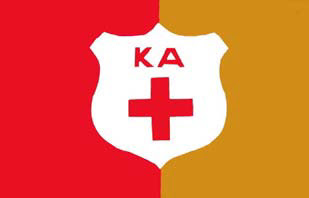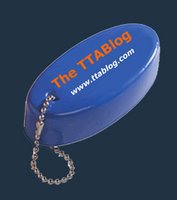TTABlog Quarterly Index: April - June 2011
E-mail subscriptions to the TTABlog are available. Just enter your e-mail address in the box on the right to receive a daily update via Feedblitz. You may also follow the blog on Twitter (here). And don't forget to leave your comments! Finally, please report any broken or inoperative links, as well as any errors and omissions, to the TTABlogger at jwelch at lalaw.com.

Section 2(a) - deceptiveness:
Section 2(d) - likelihood of confusion:
- WYHA? TTAB Affirms Trifusal of NATIONAL QUICK SALE for Real Estate Services
- Test Your TTAB Judge-Ability: Which of these Three Section 2(d) Refusals Did the TTAB Reverse?
- Test Your TTAB Judge-Ability: Are "LION GLOBAL INVESTORS" and "LION" Confusingly Similar for Financial Services?
- Test Your TTAB Judge-Ability: Which One of these Four Section 2(d) Refusals Did the TTAB Reverse?
- TTAB Sustains GAME BOY v. FLASHBOY Opposition: Likelihood of Confusion and Lack of Bona Fide Intent
- Test Your TTAB Judge-Ability: Are GRAN SOL for Tequila and GRAN VINÃ SOL for Wine Confusingly Similar?
- Precedential No. 13: In Issue-Packed 2(d) Decision, TTAB Cancels "LA INDITA MICHOACANA" Registration for Ice Cream
- Parties Choose ACR, TTAB Finds SOLARIN Not Confusingly Similar to SOLARCAINE for Sun/Tanning Products
- Differences in Financial Goods/Services, Sophistication of Customers Lead TTAB to Reverse 2(d) HOMER Refusal
- Test Your TTAB Judge-Ability: Are GIFTERGO and GIFTANGO Confusingly Similar for Gift Card Services?
- Test Your TTAB Judge-Ability: Are Flowers and Flower Pots Related Goods?
- Precedential No. 11: TTAB Limits Madrid Opposition to Goods Listed on ESTTA Form, But Opposer Wins Anyway
- Another Test of Your TTAB Judge-Ability: Are CLOUDBANKS and FOGBANK Confusingly Similar for Wine?
- WYHO? TTAB Finds BRAIN FUEL for Fresh Fruit Not Confusingly Similar to BRAINFUEL for Dietary Supplements
- Test Your TTAB Judge-Ability: Are "ITOWNS" and "IVILLAGE" Confusingly Similar for Related News Services?
- TTAB Reverses 2(d) Refusal of FUJITECH: Third-Party Registrations Insufficient to Show Relatedness of Various Electronic Goods
- TTAB Reverses 2(d) Refusal of "S9" Over Stylized ".9S" Mark for Computer Goods
- Despite Fame of "BEAUTYREST" Mark, TTAB Dismissses Opposition to "BEST REST" for Mattresses
- Test Your TTAB Judge-Ability: Are "ROOTER, MD" and "ROOTER-MAN & Design" Confusingly Similar for Plumbing Services?
- Finding TOVARICH Confusingly Similar to TVARSCKI for Vodka, TTAB Grants 2(d) Petition for Cancellation
- TTAB Finds WAGGIN' STRIPS Confusingly Similar to BEGGIN' STRIPS for Pet Treats, But No Dilution or Lack of Bona Fide Intent
- Test Your TTAB Judge-Ability: Is "RALPH LAUREN STIRRUP COLLECTION" for Watches Confusingly Similar to "STIRRUP" for Jewelry?
- Precedential No. 9: Finding Wine and Beer Related, TTAB Affirms 2(d) Refusal of "HB" over "HB & Crown Design"
- WYHA? TTAB Affirms 2(d) Refusal of LOWFARES.COM over LOWESTFARE.COM for Travel-Related Services
- Test Your TTAB Judge-Ability On This Section 2(d) Refusal of "EZ DOG & Design" for Animal Toothbrushes
- Test Your TTAB Judge-Ability: Is BUDDY'S NATURAL CHICKEN Confusingly Similar to BUDDIES?
- TTAB Dismisses "ALPHA KITTY" Section 2(d) Opposition: Opposer Failed to Prove Standing, Priority
Section 2(e)(1) - mere descriptiveness:
- SOLARWINDOW Merely Descriptive of Solar Energy Devices, Says TTAB
- Test Your TTAB Judge-Ability: Is MOTIONPOWER Merely Descriptive of Electrical Generation?
- WYHA? TTAB Affirms Trifusal of NATIONAL QUICK SALE for Real Estate Services
- WYHA? TTAB Affirms Mere Descriptiveness Refusal of ATHEROABZYME for Diagnostic Test Kits
- TTAB Affirms Mere Descriptiveness Refusal of JEWELRYSUPPLY.COM: No Tacking and Not Enough 2(f)
- TTAB Finds AMERICAN HERITAGE Neither Merely Descriptive of, Nor Deceptive for, Wines
- No Need to Disclaim "RED" in VICTORY RED for Golf Equipment, Says TTAB
- WYHP? Petition to Cancel Backfires When TTAB Finds "SNAP" Merely Descriptive of Syringes
- WYHA? TTAB Affirms Section 2(e)(1) Mere Desciptiveness Refusal of STRETCH FIT for Incontinence Briefs
Section 2(e)(2) - Primarily Geographically Descriptive:
- NORTH AMERICAN RANGE Primarily Geographically Descriptive of Beef, Says TTAB
- Test Your TTAB Judge-Ability: Is This "HOT SPRINGS NATIONAL PARK ARKANSAS" Logo Primarily Geographically Descriptive?
- TTAB Affirms 2(e)(2) Refusal of EAST COAST for Vehicle Towing Services
- WYHA? TTAB Finds CALIFORNIA GREEN CLEAN Primarily Geographically Descriptive of Janitorial Services
Section 2(f) - Acquired distinctiveness:
- TTAB Affirms Mere Descriptiveness Refusal of JEWELRYSUPPLY.COM: No Tacking and Not Enough 2(f)
- TTAB Affirms Mere Descriptiveness Refusal of JEWELRYSUPPLY.COM: No Tacking and Not Enough 2(f)
- Finding 2(f) Evidence Insufficient, TTAB Affirms Mere Descriptiveness Refusal of "eCopy" for Electronic Copying Software

Dilution:
Failure to function:
- TTAB Reverses Refusal to Register Lacquered Pet Food Container Design, Finding it Inherently Distinctive
- TTAB Affirms Refusal of the "Eddie Bauer Guarantee" for Failure to Function as a Service Mark
Fraud:
Genericness:
- TTAB Finds RADIO-INFO.COM to be Generic for ... Guess What?
- "LOCKBACK" Generic for Foldable Utility Knives, Says TTAB
- Test Your TTAB Judge-Ability on Two More Genericness Cases: MOCCA and SMOKELESS LOG
- Test Your TTAB Judge-Ability on These Two Genericness Cases: APPLICATIONSONLINE and BUBBLESEAL
Lack of Bona Fide Intent:
- TTAB Sustains GAME BOY v. FLASHBOY Opposition: Likelihood of Confusion and Lack of Bona Fide Intent
- TTAB Rules that Registrant May Challenge Cancellation Petitioner's Standing, Threatens Sanctions
- TTAB Finds WAGGIN' STRIPS Confusingly Similar to BEGGIN' STRIPS for Pet Treats, But No Dilution or Lack of Bona Fide Intent
Ownership:
- Precedential No. 13: In Issue-Packed 2(d) Decision, TTAB Cancels "LA INDITA MICHOACANA" Registration for Ice Cream
- TTAB Decides "KUZ" Ownership Dispute: a Manufacture/Distributor Family Feud
- TTAB Decides "100 BLACKS IN LAW ENFORCEMENT WHO CARE" Ownership Dispute
Procedural issues:
- Alpha Kitty Roars: Seeks District Court Review of TTAB Dismissal of 2(d) Opposition
- TTAB Rules that Registrant May Challenge Cancellation Petitioner's Standing, Threatens Sanctions
- Precedential No. 13: In Issue-Packed 2(d) Decision, TTAB Cancels "LA INDITA MICHOACANA" Registration for Ice Cream
- Precedential No. 12: TTAB Issues Pre-Trial Order in New REDSKINS Disparagement Case
- Precedential No. 11: TTAB Limits Madrid Opposition to Goods Listed on ESTTA Form, But Opposer Wins Anyway
- Precedential No. 10: TTAB Okays Opposer's Pre-Trial Disclosures, Denies Motion to Strike Trial Testimony

Res Judicata:
Specimen of use/Use in commerce:
- TTAB Affirms Refusal of FNBSECURE for Financial Services Due to Inadequate Specimens of Use
- TTAB Rules That Kappa Alpha Fraternity Logo Does Not Violate Red Cross Statute
- Test Your TTAB Judge-Ability on this Service Mark Specimen of Use
CAFC Oral Arguments/Decisions:
- CAFC Affirms TTAB's "DEALERDASHBOARD" Mere Descriptiveness Decision
- CAFC Hears Oral Argument in "LE TIGRE" Appeal from TTAB Decision Sustaining 2(d) Claim
Recommended Reading:
Other:
- New Orleans Snowball Fight Rages On: SnoWizard Seeks Review of TTAB Mere Descriptiveness Rulings
- INTA and ABA Sections Comment on Proposed TTAB Involvement in Settlement Discussions
- More Comments on TTAB Settlement Involvement: AIPLA, IPO, and John Farmer
- Paul Reidl Files Comments Re Proposal for TTAB Involvement in Settlement Discussions
- TTAB Dismisses Oldest Pending Case, Filed in 1982
- TTABlog Flotsam and Jetsam: TPAC, TTAB Dashboard, and Disclaimer Webcast
- TTABlog Job Posting: DC Area Internet Consultancy Seeks Trademark Attorney
- TTAB Posts June 2011 Hearing Schedule
- June 21st Deadline for Comments on TTAB Involvement in Settlement Discussions
- TTAB Posts May 2011 Hearing Schedule
- Swatch Seeks District Court Review of "SWAP" Opposition Dismissal
- TTAB Seeks Comments on Its Possible Involvement in Settlement Discussions
- TTABlogger Makes World Trademark Review 1000 List
- Transcript of December 3, 2010 USPTO "Trademark E-Gov Best Practices Roundtable"
- Watch for these Trademark CLE Events in April
- TTAB Posts April 2011 Hearing Schedule
Text and photographs © John L. Welch 2011.

































